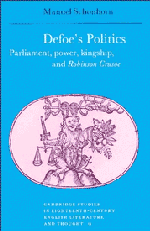Book contents
- Frontmatter
- Contents
- Dedication
- Preface and acknowledgments
- A note on attributions
- List of abbreviations
- Introduction
- 1 Defoe, dissent, and monarchy
- 2 Defoe's Reflections Upon the Late Great Revolution and the political languages of 1689
- 3 Defender of the king, 1689–1701
- 4 From the death of William III to Jure Divino, 1702–1706
- 5 Jure Divino
- 6 The politics of Robinson Crusoe
- Select bibliography
- Index
- Frontmatter
- Contents
- Dedication
- Preface and acknowledgments
- A note on attributions
- List of abbreviations
- Introduction
- 1 Defoe, dissent, and monarchy
- 2 Defoe's Reflections Upon the Late Great Revolution and the political languages of 1689
- 3 Defender of the king, 1689–1701
- 4 From the death of William III to Jure Divino, 1702–1706
- 5 Jure Divino
- 6 The politics of Robinson Crusoe
- Select bibliography
- Index
Summary
“Defoe war ein grosser Politiker.” Such is the unequivocal conclusion of Hans-Dietrich Kuckuk's 1962 examination of Daniel Defoe's political ideas. Though it would come as a surprise to Defoe's twentieth-century readers, it echoes the judgments of his eighteenth- and nineteenth-century ones. In the years following his death in 1731, nearly all of those commentators have responded to his political insights, which he derived from his supreme knowledge of the English people, their institutions, and their laws. Smollett admitted him to the ranks of “the most remarkable political writers of his age”, and a century later, in 1869, J. S. Keltie deemed him the heir of the political Milton, who, though he “arose at a different crisis of the nation's history, when all was confusion and turmoil, … saw the safety of the State rested as much upon the power of the pen as upon the power of the sword. The weapon that he could use, with more permanent effect than kings and parliaments could bring to bear, he used with unequalled persistency and success.”
But in the twentieth century, democracy and transformations in the genre of the novel have not served the political Defoe well. Writing always from the protagonist's point of view, Defoe came to be identified with the orphans and waifs, the put-upon females and the possessive individualists, of his fictions.
- Type
- Chapter
- Information
- Defoe's PoliticsParliament, Power, Kingship and 'Robinson Crusoe', pp. 1 - 8Publisher: Cambridge University PressPrint publication year: 1991

